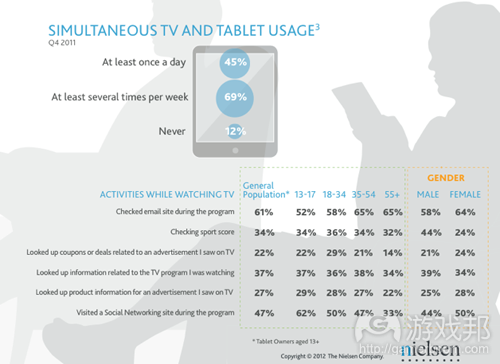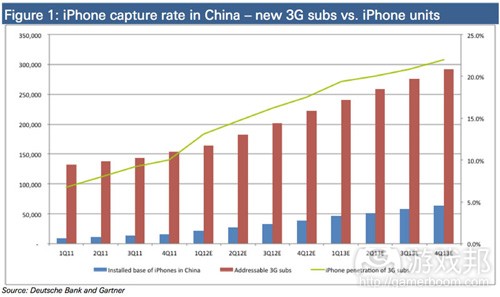每日观察:关注IAP在美国手机游戏收益占比超过90%( 5.2)
1)尼尔森最新调查显示,有45%美国人边看电视边使用平板电脑,有69%受访者每周都有数次边看电视边玩平板电脑的行为。
他们在此期间最主要的活动是查看邮件,总体用户比例为61%;其中年龄在35-54岁之间以及55岁以上群体的这一比例都是65%;女性用户的这一比例为64%。
另一项重要活动是登录社交网络,总体用户比例为47%,其中以13-17岁用户表现最为明显,所占比例为62%。
2)Canalys最新报告指出,2012年第一季度平板电脑出货量达2030万部,比去年同期多3倍。这一数据相当于所有PC出货量的19%,而去年的这一数据仅为7%。
美国是最大的平板电脑市场,该设备出货量相当于36%的PC设备出货量,而亚太地区的平板电脑出货量则同比去年增长232%,超过了500万部。
Canalys中国调研总监Nicole Peng表示,中国现在已是第二大平板电脑市场,第一季度的设备出货量比去年增长6倍,向这一市场提供本土化内容以及应用商店是供应商获得成功的关键。
EMEA(欧洲、中东和非洲)地区增幅为180%,达到470万部。Canalys分析师Tim Couling指出,欧洲有7.5亿以上的人口,是美国人口的两倍,但平板电脑出货量却仅为美国的一半左右。
苹果以58%的市场份额成为领军力量,但略低于2011年同期的74%市场份额,亚马逊Kindle Fire虽然仅向美国发售,但却能以10%的市场份额位居第二。
3)据Apple Insider报道,德意志银行分析师Christ Whitmore最近预测,2012年iPhone在中国销量可能超过2500万部,在2013年将超过3500万部(iPhone今年第一季度在中国的销量为600万部左右)。
Whitmore预计苹果两大合作伙伴中国电信和中国联通在2013年底的3G手机用户将达3亿(苹果有可能从中挖掘20-25%的市场份额,相当于向中国出售3500万部iPhone),如果苹果同中国移动合作,苹果手机的潜在用户有可能增长至4.25亿。
尽管中国移动并非苹果正式合作伙伴,但中国移动的iPhone用户也已经达到1500万。
三星目前在中国占据最大市场份额(28%),其次是诺基亚、华为、中兴,苹果则以9%的市场份额居于第5名。
摩根史坦利曾在今年1月份预测,iPhone到2013年底在中国销量将达4000万部。
4)据gamasutra报道,Rovio团队最近宣布《愤怒的小鸟太空版》发布35天已在各个平台实现5000万次下载量,成为“史上发展最迅速的手机游戏”。
该游戏发布头三天下载量就超过1000万次,《愤怒的小鸟》系列目前各个版本下载量已超过7.5亿次。
5)Newzoo最新调研报告显示,90%以上的美国手机游戏收益来自游戏中的IAP模式(游戏邦注:Newzoo调查样本为1.7万名手机游戏玩家,并引用Distimo的下载数据指出,有91%的Android和iOS游戏收益来自IAP功能)。IAP在德国手机游戏收益中占比73%,在法国市场则占比87%。
报告指出,美国iOS游戏目前收益是Android游戏的5倍左右;在2012年3月份,iOS游戏营收占据App Store及Google Play前200名游戏营收榜单收益之和的85%。
美国手机游戏玩家已达1.01亿,其中69%是智能手机游戏玩家,还有21%是平板电脑用户。
6)PopCap日前首次宣布与消费品厂商签署6项合作协议,将推出基于《植物大战僵尸》的授权产品,将在今年春季末发布包括服装、饰品、毛绒玩具、雕刻工艺品、贴牌电子产品等在内的实体商品;基于《宝石迷阵》和其他PopCap游戏品牌的周边产品也将于2013年初亮相。
7)据Windows Phone开发者官方博客消息显示,微软将在商标使用、应用质量和色情内容这三个方面提高对开发者要求,禁止开发者违反Windows Phone Marketplace应用商店政策。
微软高管Todd Brix指出,开发者注册的发行商名称及应用名称、logo、产品描述和截图等各种信息都不得讹用他人已注册的商标内容,例如不可将自己的公司注册为“微软应用公司”,或者“MSN”、“YouTube”等名称。但可以将自己的应用注册为“Reader for MSN”,只要不使用MSN的logo,不讹用微软公司名称就行。
在应用质量方面,微软要求开发商不可同时向多个产品类型提交应用;此外开发商所提交应用中也不可包含“性暗示或煽动性”的图片或内容。
8)据《悉尼先驱晨报》报道,澳大利亚国会日前要求多家软件公司及游戏发行商解释为何他们在当地征收的音乐及游戏下载费用高于海外市场。
这些需向澳国会解释定价原由的公司包括苹果和微软,澳大利亚电信部长Stephen Conroy将负责领导这场将于今年展开的质询活动。(本文为游戏邦/gamerboom.com编译,拒绝任何不保留版权的转载,如需转载请联系:游戏邦)
1)Infographic: The rise of the tablet as a second-screen device
by Zen Terrelonge
45 per cent of Americans use their tablet while watching TV each day.
Nielsen Research is behind the data, which shows how much the US loves being connected to mobile media.
Almost half of all American tablet owners use the device while watching TV daily, while 69 per cent do so several times per week.
Checking emails was the highest priority with 61 per cent, with particular interest from 35-54 year olds and those aged 55+ securing 65 per cent apiece, while females bagged 64 per cent.
Social networking was also in high demand with 47 per cent, unsurprisingly peaking with 13-17 year olds at 62 per cent.(source:mobile-ent)
2)Global tablet shipments triple year-on-year in Q1
by Zen Terrelonge
Accounts for one-fifth of overall PC shipments.
New research from Canalys shows that the tablet market has continued to surge, reaching 20.3 million shipments in Q1 2012 to more than triple the result of Q1 2011.
This amounts to 19 per cent of total PC shipments, compared to seven per cent last year, though it varies for different regions.
The US leads the tablet market with the devices accounting for 36 per cent of PC shipments, while APAC had a 232 per cent increase year-on-year – powered by China – to pass five million units.
Nicole Peng, research director, Canalys China, said: “China is now the second largest market for tablets, with shipments in Q1 six times what they were a year earlier. Localisation of content and app stores is particularly important for success here, which most foreign competitors have yet to achieve.”
Meanwhile, EMEA trailed with a 180 per cent increase to 4.7 million. The contrast between regional adoption is put down to the European economy, consumer spending habits and the availability of app store content.
Tim Coulling, analyst, Canalys, said: “There are more than 750 million people in Europe. The population is twice the size of the US, but there are only half as many tablets shipped.
Content availability is a key driver for tablets. After TVs themselves, pads are now the most popular device for watching TV content.”
Apple leads the market with a 58 per cent share, although it’s down from 74 per cent in 2011, while Amazon secured second place with ten per cent for the Kindle Fire despite a US-only release.(source:mobile-ent)
3)China’s iPhone sales could reach 35 million in 2013
by Tom Worthington
Sales of Apple’s iPhone could surpass 25 million in China this year and soar past 35 million in 2013 according to predictions from Deutsche Bank’s Christ Whitmore.
Apple’s handset sold upwards of 6 million devices in the first quarter of 2012, but Whitmore believes that the iPhone is “just getting started in China.”
Whitmore expects Apple’s two carrier partners – China Telecom and China Unicom – to end up serving 300 million 3G subscribers by the end of 2013.
That’s a potential userbase for Apple that could rise to 425 million if China Mobile is also brought on board as a partner.
Growth in the east
Benefiting from a growth in 3G subscribers from China Telecom and China Unicorn, Whitmore estimates Apple will be able to secure 20-25 percent of the market.
That would equate to 35 million iPhone sold in China by the end of 2013.
Though not an official carrier, China Mobile already has 15 million iPhone users on its network, but said userbase is locked out from achieving good 3G wireless speeds due to incompatible networks.
Super six
In comparison, Samsung currently holds a dominant 28 percent share of the market, followed by Nokie, Huawei, and ZTE. Apple currently lies in fifth place with nine percent.
It’s claimed that could all change, however, if Apple strikes up a deal with China Mobile and readies the launch of sixth-generation iPhone.
“We believe the iPhone is extremely well positioned to capture the tremendous growth in China and long-term opportunity for the iPhone in this market is substantial,” said Whitmore in a talk with investors.
In January 2012, Morgan Stanley pegged the iPhone to reach 40 million sales in China by the end of 2013.(source:pocketgamer)
4)Angry Birds Space hits 50M downloads in just over a month
by Mike Rose
Rovio’s Angry Birds is showing no signs of slowing down in terms of popularity, as the latest in the series, Angry Birds Space, is now the fastest-selling game in the series.
The game has seen 50 million downloads across all available platforms within 35 days of launch, making it “the fastest growing mobile game” ever, revealed the Rovio team.
The game originally saw more than 10 million downloads in just three days, while the entire franchise has now seen over 750 million downloads across all versions and all platforms. (source:gamasutra)
5)90% of U.S. mobile game revs come from within games – study
by Mike Rose
According to a new report from market research firm Newzoo, over 90 percent of revenue taken from mobile games in the U.S. is spent on in-app purchases and from within mobile games, as opposed to money spent on downloading games.
The study, which surveyed 17,000 mobile gamers and incorporates download data from Distimo, states that 91 percent of revenue from both Android and iOS games, respectively, comes from purchases made from within mobile games. This share is significantly higher in the U.S. than in Europe, notes the report, as the share is 73 percent and 87 percent in Germany and France respectively.
Comparing revenues from iOS and Android games, Newzoo reports that iOS games currently gross five times more money than Android games in the U.S. In March 2012, iOS games earned 84 percent of mobile revenues generated by the top 200 grossing games across the App Store and the Google Play marketplace combined.
The number of mobile gamers in the U.S. has now reached 101 million, says Newzoo, with 69 percent playing on smartphones and 21 percent on tablets.
Newzoo’s CEO Peter Warman explained, “When analyzing Apple’s successful monetization, there is one dominant factor outside of differences in audience demographics and preferences: Apple requires users to connect their credit card information directly to their account, thus creating a seamless purchase experience.”
“I can hardly imagine any other company in the world that would be able to get away with this, including Google and Microsoft. Facebook can come a long way, but Amazon clearly has the best chance and is proving this as we speak,” he concluded.(source:gamasutra)
6)PopCap explores merchandising with Plants vs Zombies products
by Mike Rose
PopCap has announced a huge merchandising push, with multiple agreements in place, marking the first time that the studio has offered physical licensed products based on its games.
Launching later this spring, products based on the Plants vs Zombies franchise will be made available, including apparel, accessories, plush toys, figurines and branded electronics. The company has signed a total of six agreements with consumer product companies.
PopCap’s Brennan Townley said that the move was part of the company’s aim to expand its various brands in “authentic, meaningful ways.” Merchandise based on the Bejeweled franchise and other PopCap games will follow in early 2013.(source:gamasutra)
7)Microsoft moves to clean up Windows Phone Marketplace
by Keith Andrew
With Windows Phone Marketplace now comfortably through the 70,000 apps barrier, so Microsoft has begun clamping down on those breaking the store’s rules.
In a post on the official Windows Phone Developers blog, Microsoft’s Todd Brix revealed the firm is to take a harder line on developers who cross the line in three areas: false use of trademarks, low quality apps, and the inclusion of overtly sexual imagery.
Making the right mark
On issue of trademarks, Brix claims a lot of apps currently breaking the rules simply because developers aren’t aware of what they are.
“Your registered publisher name and everything about your app – name, logo, description, screenshots – must be unique and free of trademarked content unless you own the trademark, you’ve secured permission from the owner to use it, or you’re using a trademarked name to describe your app’s features or functionality without suggesting that the app is actually published by the trademark owner,” details Brix.
“For example, using ‘Microsoft App Co.’ as your publisher name would cause problems because ‘Microsoft’ is a trademarked term. By the same logic, you couldn’t call your app ‘MSN’ or ‘YouTube’.
“However, you may be able to make an app called ‘Reader for MSN,’ as long as you don’t use the MSN logo or otherwise suggest that the app is published by Microsoft.”
Raising the standard
When it comes to quality, Microsoft is proposing a general clean up. Developers should not submit their app in multiple categories, for instance, or publish scores of similar titles simultaneously.
The tile images used to represent the apps should also be different, while Microsoft will be taking a hard line with apps that use popular search terms as false keywords, such as ‘Justin Bieber’ or ‘YouTube’.
Finally, Microsoft claims it will also be taking a closer look at apps that feature sexual content – something that may well worry those behind the iKamasutra app, who have encountered problems on Apple’s App Store for similar reasons.
“We don’t allow apps containing ‘sexually suggestive or provocative’ images or content,” concludes Brix.
“What we do permit is the kind of content you occasionally see on prime-time TV or the pages of a magazine’s swimsuit issue.”(source:pocketgamer)
8)Australian government to question game publishers over high download prices
by Mike Rose
A number of software companies, including video game publishers, will be asked to explain to the Australian Parliament why downloads of music and games cost much more in Australia than compared to overseas.
The Sydney Morning Herald newspaper reports that Apple and Microsoft are among the companies who are being invited to explain their Australian pricing. The country’s Minister for Communications Stephen Conroy is leading the parliamentary inquiry, which is also looking into high pricing of technology-related products.
The inquiry will begin later this year, and will be conducted by the House of Representatives standing committee on infrastructure and communications. Sydney MP Ed Husic noted, “People here scratch their heads trying to work out why they get fleeced on software downloads.” (source:gamasutra)











































 闽公网安备35020302001549号
闽公网安备35020302001549号